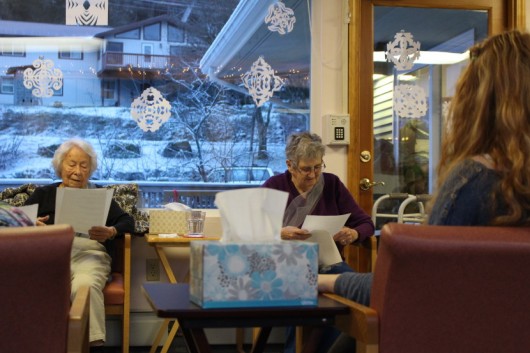For seniors in Southeast, health care and housing options are limited. But a couple of adult day programs are offering relief for care providers, families and friends. They’re often a stop-gap solution until space opens up in a home.
As part of the CoastAlaska series Aging Southeast, KTOO’s Elizabeth Jenkins explains that while there’s a long way to go, some seniors are receiving help in surprising ways.

The Bridge in Juneau is one of two formalized adult day programs in Southeast. The program costs $180 a day and accepts Medicaid waivers. (Photo by Elizabeth Jenkins/KTOO)
At Juneau’s Bridge Adult Day Program, it isn’t all bingo and reruns of Lawrence Welk. Kelsey Wood, the program supervisor, says the aging adults go on field trips. They play Nintendo Wii–virtual bowling is a favorite. And they do what some might describe as contemporary exercises.
“There’s some leg movements that go to it,” she said. “There’s like a stanky leg thing or something like that…They’re like ‘this how people dance right now?’ And they’re like ‘oh, we remember when the twist was popular.’”
Wood says, like a lot of things at The Bridge, the exercises can be adapted for seniors with limited mobility. And that same thoughtfulness is given to people with memory loss. Most of The Bridge’s clients are experiencing some form of that.
This morning, Wood is helping Beth Fletcher play her best game of 7-up. But it’s not a typical day. Later, there’s a party planned in celebration of Wood’s wedding.
After a few minutes playing cards, Fletcher is throwing down winning hands.
It’s an activity she’s nostalgic for. She grew up playing Buck Euchre with her siblings in  Minnesota and says she loves the attention she gets from Wood.
Minnesota and says she loves the attention she gets from Wood.
“Boy, my memory isn’t very good you know, I’m 90-something,” she said. “So I can’t remember a lot of what I did when I retired. When I was young, I rode horseback. Before I could walk, I rode horseback…My mind doesn’t hold things very well. But anyway, I had a great life.”
Fletcher comes to The Bridge four times a week. The difference between a program like this and a nursing home or assisted living facility is she goes home to family at the end of the day. And for some seniors, that’s the best option.
“For folks that are waiting to get into a Pioneers’ Home, are waiting to get into nursing-level care, it fills that gap,” Wood said.
Depending on the location, state-run Pioneers’ Homes screen applicants on application date and other criteria. In Juneau, it’s first-come-first serve. In Sitka, it’s based on date and level of care. Still, the wait can sometimes be years before a space opens up. And Juneau’s Wildflower Court, which is a nursing home, doesn’t admit clients–based on memory loss alone.
So are there enough adult day programs to help fill the gap in Southeast?
“No, there are not,” said Maryanne Mills, director of Southeast Senior Services. “In fact, a couple of years ago, we worked with Centers for Community to submit a proposal to Alaska Department of Health and Social Services for a program in Sitka.”
There are only a few formalized adult day programs in the region, like Ketchikan’s Rendezvous Senior Day Services. The grant intended for Sitka wound up going to the Mat Su Valley.
“And of course right now, with Alaska’s fiscal crisis, getting state general funds to start such a program is probably not going to happen in the immediate future,” Mills said. “We’re trying to hold on to what we have.”
Mills says keeping the doors open for adult day programs saves money when you consider the alternative. Remember, most of the people at The Bridge have some form of memory loss, which could mean expensive full-time care.
So for those who do stay at home, Mills thinks the time to socialize is important.
“It’s sometimes not the natural way to be. A lot of people tend to isolate when they get older but that’s not what they should be doing if they want to live a long, independent life for as long as possible,” she said.
Back at The Bridge, the cozy living room atmosphere has been transformed into a pretend wedding. The seniors wear frilly corsages and sip sparkling grape juice.
And after a while, Wood and her fiancé are ready. She’s wearing jeans, clutching a bouquet made out of sparkling brooches — the one she’ll carry on her actual wedding day.
Deeann Grummett and her 78-year-old husband are looking on. Grummett brings him to The Bridge four days a week.
“You know, I pop in and out at different times and they’re always engaged in an activity,” she said. “They’re not just sitting around staring at the walls. They seem to enjoy each other’s company, and the staff are wonderful.”
Both Grummett and her spouse are on the waitlist for the Pioneers’ Home, but she wants to keep him with her as long as she can. She says The Bridge plays a crucial role in helping her do that.
“At this point for us, it’s much better than even in-home services, because what we need is a social experience,” she said. “My husband has reached the point where he can’t plan and carry out his own social life, and he needs a social life.”
She says when she drops her husband off in the morning, and if he’s in a not-so-great-mood, he’s always feeling better by the end of the day.
Stay tuned for more of CoastAlaska’s Aging Southeast series, a look at issues affecting senior citizens in the region.






